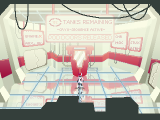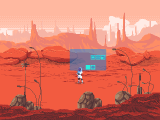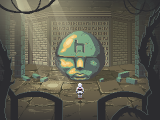Note: This review was written entirely sans PR materials and research; ordinarily, we pride ourselves on diligence and copious amounts of background research, but due to the game’s clear intentions and sensibilities, chose to approach this review differently.
The single worst thing about adventure games – the one aspect that is also almost wholly unique to them – is being stuck. (Worse still, in fact, is knowing when you’re badly stuck.) For players, after all, adventure games are all about progression; for developers, they are all about managing it.
The genre on the whole is a curious balancing act of controlling tempo, pacing, difficulty, balance, and the flow of information.
Peter Moorhead’s Stranded, then, is supposed to be
“[…] a minimalist adventure game that foregoes dialogue and puzzles to focus on atmosphere, mystery, and exploration; it is both a love letter to classic point & click adventures, and an experiment with the fundamentals of the genre.“ 1)http://store.steampowered.com/app/295250/
To read the store page like the Devil does the Bible, then, according to the quote the fundamentals of adventure games are 1) dialogue, and 2) puzzles. From what I could gather, Stranded has neither of these things. Hence, it would be perfectly fair to state that Stranded is either a piss-poor adventure, or it isn’t one at all. Love letter? More like breaking up with emoji.
Perhaps more intriguingly, however, one could rather say that Stranded’s chief problem – despite its admirable wishes to subvert and experiment with genre – is that it actually encapsulates the very worst features of adventure games: Poor controls; awful interface; slow speed; and a huge focus on the player fulfilling the designer’s wishes instead of their own. Stranded is “fundamental” in the sense of ‘basic’ and “experimental” if that means ‘tentative.’
Though Stranded’s Steam description cites dialogue and puzzles as integral to adventures, in fact, they are much more are about the dissemination and delivery of these two things, of controlling information flow in the form of storytelling (narration), as well as different types of building: 1) character-, 2) world-, and 3) event-building.
Every adventure game, after all, is about being ‘stranded,’ if you will – just think of classic games like Monkey Island, King’s Quest, et cetera. Almost all games and game concepts, both good and bad, are introduced to us in medias res; the difference between good and bad here is often how well the introduction is done, really. So much of the very point in video games is for players to learn the ropes, their surroundings, characters, events, and so forth.
In the adventure game genre, this becomes a series of gated events and actions. That’s how adventure games work: Exposition as reward for player actions (as in, solving puzzles, talking, etc.). Where does this leave Stranded, then?
It is a shipwreck, an aircrash, a disaster. It is the antithesis of everything I want from an adventure game. The slow, unrelenting crawl of its protagonist; the clunky movement confined entirely to the x/y-axes; its no-interface approach, its poorly designed hotspots, its forced extra clicks of the mouse. The sins of this experiment are far too vast and numerous to even list.
Stranded is opaque, oblique, meandering, and extremely limited.
Undoubtedly, it is also beautiful, very beautiful, and sounds fantastic (the OST, by Joe “Stux” Edwards, is available on Bandcamp, and is highly recommended listening). Every time you play Stranded, its landscape changes – that much I could gather. But even when something moderately interesting – that is, new – happened, whatever little agency I had in this little game amounted to absolutely nothing. The game has no sense of urgency, danger, or interest, nothing like The Dig, an obvious parallel, which feels like you were constantly fighting for your lives, and your survival.
But perhaps this is the point. Perhaps Stranded is all about being stuck.
That something so clearly ambitious, and artistic, should also be so infuriating, bland, and all-around awful, is a real head-scratcher to me. How do you even approach it? Some reviews end up investigative, focusing on finding out the ‘truth’ of a game. Some are interpretative; some are more descriptive, and some are prescriptive.
Reviewing Stranded? There was nothing to be done here. No mode of review – other than simply not reviewing it – that I can think of works on this game. Discussing the game amounts to nothing, as I can not in any sense claim to have understood it. There’s nothing to interpret, and as such, nothing to say. I have only experienced Stranded, and my time with it was of irritation, annoyance, and boredom. From this experience, I have gained nothing.
I’m stuck – a few Steam trading cards richer, that’s all – and I know it.
Stranded is available on Steam, and from the developer’s website.
Access to the game was provided for the purpose of this review.
References


